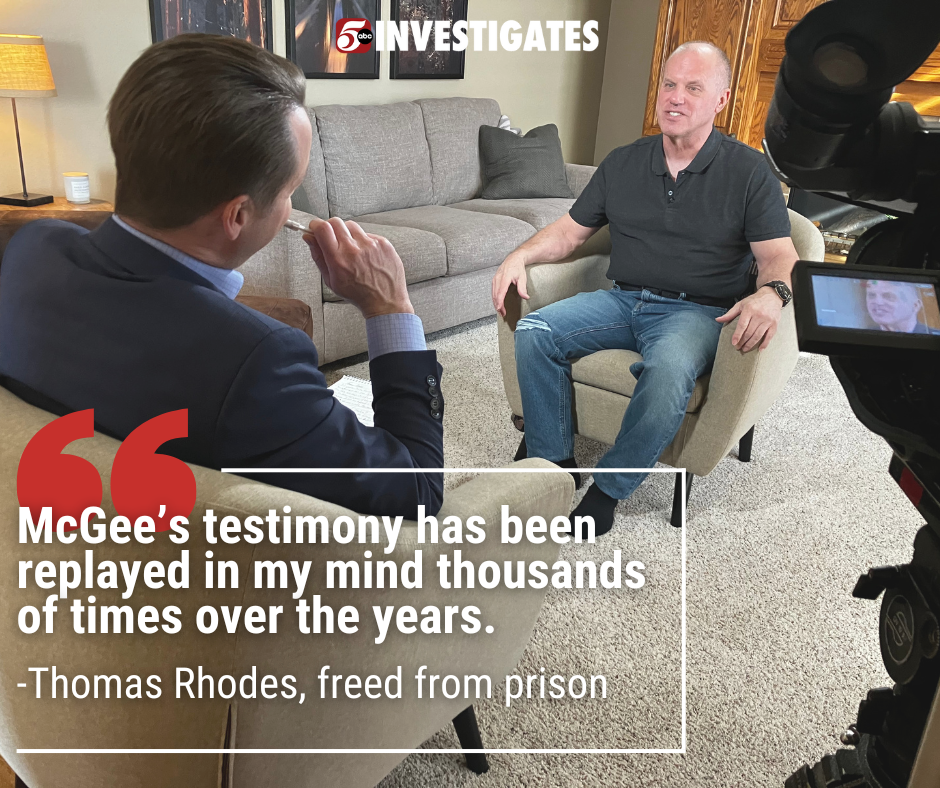After serving 25 years for murder he didn’t commit, Minnesota man reflects on case, ‘unreliable’ witness
For nearly two decades, Thomas Rhodes sat in a prison cell for a murder he did not commit, replaying the key testimony that put him there.
Rhodes was convicted in 1998 of murdering his wife in Kandiyohi County.
But in January, his conviction was thrown out due to flaws in the case, including testimony from an “unreliable” medical examiner.
“He indicated that I did something to my wife,” Rhodes said. “I was trying to save her.”
In his first interview since being released from prison, Rhodes talked to 5 INVESTIGATES about the evidence that led to his conviction and the perseverance that set him free.
“After all these years of being locked up, it just feels wonderful,” Rhodes said last week while walking through a quiet South Dakota neighborhood where he is staying with family.
The Tragedy
Rhodes’ wife, Jane, died in August 1996 after a late-night boat ride on Green Lake in Spicer, Minn.
Inside the Kandiyohi County courthouse, 5 INVESTIGATES recently reviewed the evidence that sent Rhodes to prison more than two decades ago, including old VHS tapes of his interviews with police.
From the beginning of the investigation, Rhodes repeatedly said that Jane accidentally fell overboard and drowned.
“I got in the water to see if I could rescue her, but I couldn’t find her,” he told them at the time.
Prosecutors argued Rhodes killed his wife by pushing her into the water and then intentionally ramming her with the boat.
Their case hinged on findings from Dr. Michael McGee, a longtime and well-respected medical examiner in Ramsey County.
“He did the autopsy on Jane,” investigators told Rhodes in 1996. “And he has some questions about what happened out there also.”
McGee’s testimony helped convict Rhodes of first and second-degree murder and led to a life sentence.
“McGee’s testimony has been replayed in my mind thousands of times over the years,” Rhodes said.
Nearly 25 years later, that same testimony would clear his name.

Nine experts
While isolated in prison, Rhodes kept fighting his conviction.
In 2013, the Great North Innocence Project offered to help and took the evidence to nine other medical examiners.
They all disagreed with Dr. McGee’s findings.
The Innocence Project said none of them would have called Jane’s death a murder.
But when Rhodes appealed his conviction, the Attorney General’s office stood by Dr. McGee.
Matthew Frank, a veteran prosecutor, argued in 2015 that there was nothing “to establish that the science underlying Dr. McGee’s opinion is false.”
Frank went on to say that Rhodes had simply lined up more doctors to offer the same theories.
“That should not ever be enough to grant somebody a new trial,” he said.
Today, Rhodes says he believes prosecutors “only wanted to win,” and that’s why they didn’t question McGee’s work.
“How could you not, with the strength of what we had, not at least look hard at it and acknowledge what was there?” Rhodes said. “And they never offered one person to support McGee’s testimony and opinion, not one.”
Attorney General Keith Ellison, who was not in that office when Rhodes appealed his conviction eight years ago, declined to be interviewed about the case.
In a statement, Ellison said defending the conviction at that time was “routine and normal.”
He added that the Supreme Court upheld the conviction because they were “not persuaded” by the medical experts Rhodes retained.
But the same office that fought to keep Rhodes in prison would ultimately throw him a lifeline.
“Unreliable”
Ellison asked the new Conviction Review Unit at the Attorney General’s office to review the case after McGee’s reputation as a trusted trial expert took a jarring blow.
In 2021, a federal judge in North Dakota said the medical examiner’s “unreliable” opinions “infected” a separate murder trial.
The judge added that McGee had a “well-documented history of providing false or inaccurate testimony in court.”
The damning words echoed through Rhodes’ mind.
“It was so familiar from my own case,” he said. “Exactly the same pattern.”
Since the ruling in North Dakota, McGee’s work has been under growing scrutiny.
As 5 INVESTIGATES first reported, the Ramsey County Attorney’s Office is now reviewing more than 70 convictions where McGee’s testimony or expertise played a significant role.
In January, the Conviction Review Unit concluded McGee’s testimony in Rhodes’ case was also “flawed.”
McGee declined to be interviewed as part of that review. When reached by phone this week, he hung up before 5 INVESTIGATES could ask about Rhodes’ case.
In a statement, Ellison said the Conviction Review Unit was able to look at McGee’s testimony with a “new, independent eye.”
No Compensation
Ellison agreed to vacate the murder convictions if Rhodes pled guilty to involuntary manslaughter, which allowed him to be released from prison.
Since Rhodes pled to a lesser charge, he’s not considered fully exonerated and therefore, not entitled to compensation from the state.
The Great North Innocence Project has set up a GoFundMe page to help Rhodes adjust to life outside of prison.
In South Dakota, Rhodes is trying to reconnect with family and friends. He’s focused on finding a place to live and work.
“It’s got me nowhere to be angry and upset,” Rhodes said. “Now I’m free, and it’s time for me to focus on the future and leave the past in the past.”